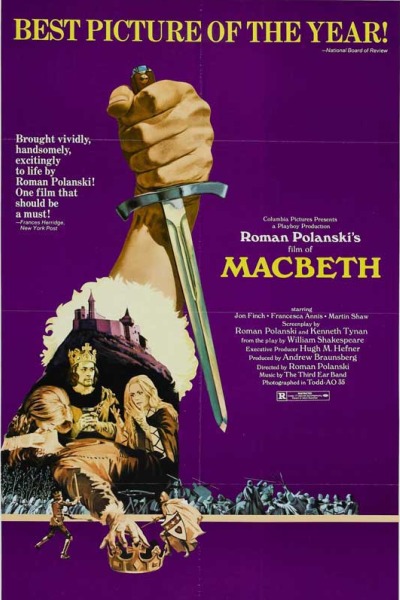
As I afore mentioned, Macbeth was the first Shakespearean play I ever read. It being such I have a special connection with this play. I love the pure evil and the paranoia and just all of the brutal gorey violence of the play itself. I also love all of the superstition that comes with many of Shakespeare's plays. This particular play has a 'curse' passed down for generations from actors to actors. In early presentations of Macbeth the actors who were supposed to be 'killed' onstage were actually killed a few times. So now, I believe, the curse is as follows: no one is to say the word Macbeth inside the theater, hence it doubly being referred to as The Scottish Play. Things like this curse and all the superstition around Shakespeare himself are some of the best things about reading. While absorbing the basic,wonderful plot in itself, there are also the many layers of metaphor, symbolism and historic reference to enjoy. Even while trying to comprehend all of that there is still wondering why he wrote what he did and what he was thinking of and all of the possible mysteries involved with he name William Shakespeare.There are so many things I love about this play, but if I had to choose a favorite aspect it would be the weird sisters and the possibility of supernatural occurrences. I myself am very interested in the supernatural and I love the haunting, hallowed rhymes of the witches. They have stood the test of time and I believe for good reason. As all Shakespeare, this play and its characters are remembered for their brilliance. Macbeth is a well known play because it appeals to most everyone. The plot is straight forward and quickly moving, so it appeals to the general public as it is. There are also a lot of undertones and historical references that satisfy the mpre devoted reader. I myself have read this and many other Shakespearian plays simply for the love of the language and the appreciation for the vague storyline I did understand. I did not think I could I love the work of William any more. Now that I am learning more and more I have come to love and appreciate The Tragedy of Macbeth for all that it is.

The play begins with the witches, so it only makes sense that I begin with the talk of these weird sisters. I am aware that they are never actually called 'witches' in the play but forgive me for assuming they were. the fact that they were never called such does bring up a very good point. However, I shall mention that topic later. The weird sisters nearly always speak in rhyme, or in some poetic manner. This is important for three reasons. One: this rhyming makes the witches lines morememorable. Everything they say does matter and should be paid great attention to. Two: this constant rhyme allowed William to really play with language, as he is famous for. Three: it stays true with common witchcraft beliefs. In this time period using the beliefs of the people would have been keen in pleasing them. If the audience believed that witches spoke in ambiguos rhymes, then he had to make the sisters speak so. The sisters were definitely ambiguos, that is also an important point. While keeping up with his iambic rhyme scheme, Shakespeare may have seen many oppurtunities to plant little seeds of mysteries. Instead of wasting his time finding a rhyme that spells out exactly what the characters are trying to convey, he makes the language beautiful, and fluid and leaves it as is. I also believe Shakespeare was just a clever devil and a true artist with words and would have known what would sound best. The open ended language the women use also refelcts their open ended identities. Are they witches? Or are they simply odd, outcast women who wish to stir up trouble. The very nature of Macbeth is the constant questioning. It is no accident that Macbeth questions their actions, and questions his own actions. Banquo questions them, not just to verify appearance, but to get the audience questioning. Us as the readers have a responsibility to also question these weird sisters. To question everything, honestly. The premise of Macbeth is not knowing, wondering and being unsure, and with this knowledge trying to distinct everything for what it is. The play is an enormous cloud, if you so choose, your own interpretations reveal what is behind that ambiguos, mysterious cloud.

Once Macbeth and Banquo meet these witchy women, they are instantly intrigued, if not only for sport. It is blatant human curiosity that presses them to listen closer and more carefully to what they have to say. It is the word of the sisters that really gets Macbeth going. As most of Shakespeare, the plot picks up pace right here near the beginning. This pattern is one of my favorite aspects of the Shakespearean writing style. Banquo and Macbeth are definite foils of one another. While Macbeth is demanding and instantly deeply intrigued by the prophecy, Banquo lets it go from his mind as easily as it came. This thematic element arises many times in the play. Directly upon hearing what the weird women have to say Banquo insists Macbeth to let it go. He does and at this point Macbeth still has a conscience. Then the first part of the foretold becomes reality; he is named Thane of Cawdor. Upon this action he is wrestling with himself what and how he should feel. Then he writes a letter to his wife. So, he begins his plotting.

Macbeth is obviously not the only one plotting. The instant Lady Macbeth (hereafter called Lady) reads the letter she begins contemplating the possibilities. It is also rather obvious this is not the first time this has been talked of. It is my interpretation that they both were power seeking figureheads and have been waiting for the right chance to put their scheming to action. Needing only the slightest encouragement, these loaded guns are ready to fire at any moment. The witches loaded and cocked and did all but pull the trigger of Macbeth and Lady. Their ambition was the straw that broke the camels back. Lady seems to have a considerable less amount of ambition in total but appears to have her fill of it near the beginning. I believe it was his wife's ambition and persuasion that really led to the first murder.
.jpg)
.jpg)
Lady is so evil just pure evil. At least that is how she seems. Again we see the deceptive element of the play. She seems just so vile and ruthless and we come to find out later she's all talk. She wants the power but does not want to be involved in the deeds done to obtain that power. I believe she also overestimates herself and her own boundaries. She is so caught up in her husband seeing her as apathetic and strong that she fools herself into believing she can handle the guilt of murder. She eventually just loses it. Once the first murder is done she is rather satisfied. But, Macbeth, no, Macbeth is not satisfied, he is never satisfied. He became so paranoid that he turned into a merciless tyrant. Lady's initial ambition is greater than his, but Macbeth's undying hunger for power is so strong it is truly that of legend.
The first murder really gets things rolling. More and more murder takes place and soon it spins just out of control. So then he returns to the sisters. This time they give him a potion (or a hallucinogenic, whichever you prefer to call it) and lead him to heavily believe he is safe. His heinous acts have not gone unnoticed however and the rest of the Scottish noblemen are busy at work assuring the death of the terrible king. Once the troops come to the Castle Dunsinane, he is very sure he will not fail. However, the ambiguity of the witches then strikes again and Macbeth sees each small part of their prophecy coming true in an unexpected way. Knowing he is to be defeated he fights in a raging fury until he is beheaded and hence is finally dead.

There is a reason everyone knows the name Macbeth. It is truly an unforgettably haunting tale. The brilliant plot line and use of language aside, there are so many layers to nearly every stanza of his writing that people are still delving deeper and deeper into his writings. Scholars find new clues everyday and new interpretations are created every time the play is read. Macbeth has made a lasting impression on me.
.jpg)















.jpg)
.jpg)

.jpg)